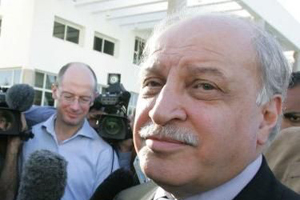|
Iraq's Deputy Foreign Minister Labeed Abawi underlined that presence of the anti-Iran terrorist Mojahedin-e Khalq Organization (MKO, also known as MEK, PMOI and NCR) in Iraq is illegal, reiterating that Baghdad is determined to expel the terrorist group. |
 Abawi said in a statement that MKO's presence in Iraq does not meet the description of asylum, and stressed that Baghdad is determined to close the terrorist group's main training base, Camp Ashraf, and drive MKO elements to another country.
Abawi said in a statement that MKO's presence in Iraq does not meet the description of asylum, and stressed that Baghdad is determined to close the terrorist group's main training base, Camp Ashraf, and drive MKO elements to another country.
He reiterated that MKO's presence in Iraq has not justification, saying, "The elements of the MKO are illegal. They came to Iraq and were used by the former regime for military purposes, they are not refugees because according to the Iraqi law they don't qualify for asylum."
The MKO, whose main stronghold is in Iraq, is blacklisted by much of the international community, including the United States.
Before an overture by the EU, the MKO was on the European Union's list of terrorist organizations subject to an EU-wide assets freeze. Yet, the MKO puppet leader, Maryam Rajavi, who has residency in France, regularly visited Brussels and despite the ban enjoyed full freedom in Europe.
The MKO is behind a slew of assassinations and bombings inside Iran, a number of EU parliamentarians said in a recent letter in which they slammed a British court decision to remove the MKO from the British terror list. The EU officials also added that the group has no public support within Iran because of their role in helping Saddam Hussein in the Iraqi imposed war on Iran (1980-1988).
Many of the MKO members abandoned the terrorist organization while most of those still remaining in the camp are said to be willing to quit but are under pressure and torture not to do so.
The group, founded in the 1960s, blended elements of Islamism and Stalinism and participated in the overthrow of the US-backed Shah of Iran in 1979. Ahead of the revolution, the MKO conducted attacks and assassinations against both Iranian and Western targets.
The group started assassination of the citizens and officials after the revolution in a bid to take control of the newly established Islamic Republic. It killed several of Iran's new leaders in the early years after the revolution, including the then President, Mohammad Ali Rajayee, Prime Minister, Mohammad Javad Bahonar and the Judiciary Chief, Mohammad Hossein Beheshti who were killed in bomb attacks by MKO members in 1981.
The group fled to Iraq in 1986, where it was protected by Saddam Hussein and where it helped the Iraqi dictator suppress Shiite and Kurd uprisings in the country.
The terrorist group joined Saddam's army during the Iraqi imposed war on Iran (1980-1988) and helped Saddam and killed thousands of Iranian civilians and soldiers during the US-backed Iraqi imposed war on Iran.
Since the 2003 US invasion of Iraq, the group, which now adheres to a pro-free-market philosophy, has been strongly backed by neo-conservatives in the United States, who also argue for the MKO to be taken off the US terror list.
